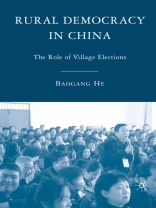This book examines village democracy and the prospects of China’s democratization. It explains how three key factors – township, economy and kinship – shape village democracy and account for rural variations. It considers the extension of village to township elections, the idea of a mixed regime and its impact on political development in China.
Inhaltsverzeichnis
Introduction PART I: DIMENSIONS OF VILLAGE DEMOCRACY Development of Democratic Procedures Village Citizenship Competitiveness of Village Elections Political Participation and Voting Behavior Village Representative Assembly PART II: THE LIMITS OF VILLAGE DEMOCRACY Village Elections and Village Power Structure Women and Village Elections PART III: THE SHAPE OF VILLAGE DEMOCRACY Township Authorities and Village Elections Political Economy of Village Democracy Kinship and Village Elections PART IV: PROSPECTS OF CHINESE DEMOCRATIZATION From Village to Township Elections Conclusions
Über den Autor
BAOGANG HE is chair of International Studies at Deakin University, Melbourne, Australia. He has published five books on various aspects of Chinese democratization. His recent publications have focused on deliberative democracy in China and federalism in Asia. His is the co-editor (with Ethan Leib) of a newly released volume,
The Search for Deliberative Democracy in China.












